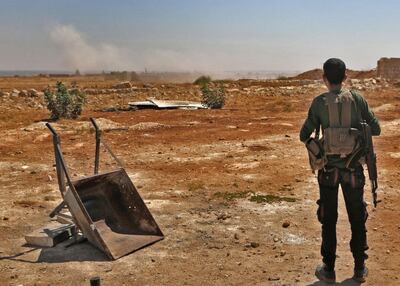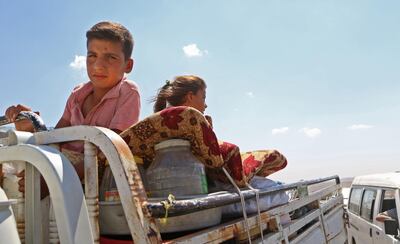Hundreds of civilians fled a feared Syrian government offensive in Idlib on Thursday, as international powers prepared for last minute talks aimed at avoiding major bloodshed.
More than 1,000 people left villages in the southeast of the province for the countryside of western Aleppo and the city of Afrin, according to a local monitor.
The province has come under heavy bombardment in recent days by Russian airstrikes and Syrian artillery, leading to speculation that an offensive to recapture the last rebel holdout in the country is imminent.
Russia, Turkey and Iran are due to meet on Friday in what observers have described as the last chance to avoid what could become one of the deadliest battles of the civil war.
The United Nations has said that a large-scale offensive would cause a "humanitarian catastrophe" for Idlib’s nearly three million residents, while doctors on the ground have warned that they are short on supplies and would be overwhelmed.
_________
Read more:
Idlib doctors, fearing another Aleppo, plan for the worst
US renews warning to Assad and calls for Security Council meeting on Idlib
Idlib's ruling militant group finds itself alone as regime forces advance
Syrian government flexes its might with sights on Idlib
_________
Turkey has a significant military presence in Idlib and supports a number of rebel groups that oppose President Bashar Al Assad’s rule. But around two thirds of the province is controlled by the extremist Hayat Tahrir Al Sham (HTS), a former affiliate of Al Qaeda, that Russia and Syria have vowed to eliminate.
Talks between the presidents of the three countries are likely to focus on the group’s presence. Russia struck a defiant tone on Thursday ahead of the summit, saying it would continue to target “terrorists.”
"We have killed, we are killing and we will kill terrorists...whether that be in Aleppo, Idlib or other parts of Syria. Peace must return to Syria," said foreign ministry spokeswoman Maria Zakharova. "This is a question of our security," she added.
Ankara is keen on finding a solution that would not threaten its influence in northern Syria and prevent mass displacement towards its borders. Speaking on Wednesday, President Recep Tayyip Erdogan said: "In a situation like this, where will the fleeing people go to? A large proportion of them will come to Turkey.”
Turkey has echoed US officials in urging a limited, counter-terror approach to Idlib, rather than a full-on attack. But Syria and Russia have repeatedly expressed their intention to launch an offensive if HTS is not dealt with.

Analysts anticipate a phased operation that targets the west of Idlib, which lies within reach of Russian bases on the coast, and secures the M5 highway that runs through the province.
Amnesty International said millions of lives depend on the outcome of the summit, which is due to take place in Tehran.
“The lives of millions of people in Idlib are now in the hands of Russia, Turkey and Iran — the three countries with the most influence over the parties involved in the conflict in Idlib,” said Samah Hadid, Amnesty International’s Middle East Director of Campaigns. “As this crucial summit convenes, they have the power to ensure civilians are protected from the relentless unlawful attacks that have characterised much of this brutal conflict.
If an attack is launched, the displacement of some 180 families closer to Turkey overnight on Wednesday could be a small sign of things to come. According to the Syrian Observatory for Human Rights, the families fled after intense shelling and airstrikes that killed 13 civilians.
The UN estimates that around 700,000 people could be displaced in the first stages of an assault, with many more following if it is intensified.

The United States and other Western countries have expressed concern that chemical weapons may be used by the Syrian government, as they have been in the past.
On Wednesday, President Donald Trump said the offensive "cannot be a slaughter".
"If it is a slaughter the world is going to get very, very angry and the United States is going to get very angry too,” he said.
France's top military official echoed that warning on Thursday.
"We are ready to strike if chemical weapons were used again," Armed Forces Chief Francois Lecointre told reporters. "They can be carried out at national level but it's in our interest to do it with as many partners as possible."





